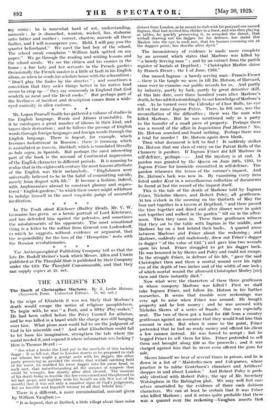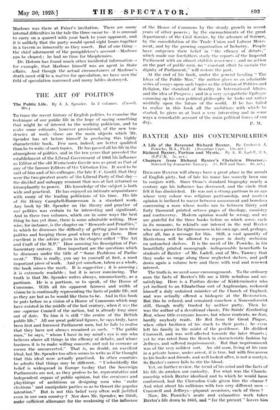THE ATHEIST'S END
The Death of Christopher Marlowe. . By J. Leslie Hotson. (Nonesuch Press. Unlimited Edition. Is. 6d. net.) IN the reign of Elizabeth it was not likely that Marlowe's death would escape the notice of religious pamphleteers. To begin with, he was " a Poet, and a filthy Play-maker." He had been called before the Privy Council for atheism, and he was killed in a brawl while the charge was still hanging over him. What pious man could fail to see the judgment of God in his miserable end ? And what Elizabethan could fail to let loose his imagination, strengthen the tale where the moral needed it, and expand it where informationwas lacking ? Here is Thomas Beard :-- " See what a hooke the Lord put in the nosthrils of this, barking dogga : It so fell out, that in London streets as he purposed to stab one whome hee ought a grudge unto with • his dagger, the other party perceiving so avoided the stroke, that withall catching hold of his wrest, he stabbed his owne dagger into his owne head, in such sort, that notwithstanding all the means of surgerie that could be wrought, bee shortly after died thereof. The manner of his death being so terrible (for hee even cursed and blasphemed to his last gasps, and togither with his breath an oth flew out of his mouth) that it was not only a manifest signs of God's judgement, but an horrible and fearefull terrour to all that beheld him."
There is a- different, a more 'circumstantial, account given by William Vaughan :— • . • " It so hapned, that at Dotford, a little village about three miles
distant from London, as he meant to stab with his ponyard one named Ingram, that had invited him thither to a feast, and was then playing at tables, he quickly perceyving it, so avoyded the thrust, that withal! drawing out his dagger for his defence, hee stabd thie Marlow into the eye, in such sort, that his braines comming out at the daggers point, hee shortlie after dyed."
The inconsistency of evidence is made more complete by an account which states that Marlowe was killed by
" a bawdy Serving man " ; and by an extract from the parish register of burials at Deptford : " Christopher Marlow slain by ffrancis ffrezer ; the 1 of June, 1593."
One named Ingram—a bawdy serving man—Francis Frczer —there is the tangle we were in till Dr. Hotson, of Harvard, came over to examine our public records for us. And partly by industry, partly by luck, partly by great detective skill, at this late date, over three hundred years after Marlowe's death, he has added astonishingly to our knowledge of Marlowe's end. As he turned over the Calendar of Close Rolls, his eye
fell on the name Ingram Frizer. There, he felt sure, was the
reconciliation of the difficulties ; there was the man who killed Marlowe. But he was mentioned only as a party to the transfer of a small piece of property. Perhaps there
was a record of the affair in Inquisitions Post Mortem ? No Dr. Hotson searched and found nothing. Perhaps there was
a trial for murder ? Dr. Hotson again drew blank. -
Then what document is left to find ? It suddenly strikes Dr. Hotson that one class of entry on the Patent Rolls of the Chancery is pardons. If Ingram Frizer did kill Marlowe in self-defence, perhaps-- And the mystery is at end. A pardon was granted by the Queen on June 28th, 1593, to Ingram Frisar for homicide committed in self-defence. The pardon rehearses the terms of the coroner's inquest. And Dr. Hotson's luck was now in. By examining every item listed under Kent in a miscellaneous collection of documents he found at last the record of the inquest itself.
This is the tale of the death of Marlowe told by Ingram Frizer, Nicholas Skeres, and Robert Poley, all gentlemen. At ten o'clock in the morning on the thirtieth of May the four met together in a tavern at Deptford, " and there passed the time together and dined and after dinner were in quiet sort together and walked in the garden" till six in the after- noon. Then they came in. These three gentlemen witness that they sat to the table with Ingram in the middle, and Marlowe lay on a bed behind their backs. A quarrel arose between Marlowe and Frizer about the reckoning ; and Marlowe, suddenly and maliciously, drew out Frizer's- dagger (a dagger " of the value of 12d.") and gave him two wounds upon his head. Frizer struggled to get his dagger back. He was hemmed in by Skeres and Poley and could not escape. In the struggle Frizer, in defence of his life, " gave the said Christopher then and there a mortal wound over his right eye of the depth of two inches and of the width of one inch ;
of which mortal wound the aforesaid Christopher Morley [sic] then and there instantly died." -- - Now what were the characters of these three gentlemen in whose company Marlowe was killed ? First we shall take Ingrain Frizer, and follow Dr. Hotson in his further researches. It seems that trouble over reckonings was very apt to arise when Frizer was around. He bought property and he lent money ; and he was accused with Nicholas. Skeres of a series of frauds. One was especially neat. The two of them got a bond for £60 from a country gentleman against an assurance that they would lend him that amount in cash. But when it came to the point, Frizer pretended that he had no ready money and offered his client a few cannon instead. He was forced to accept ; _but he begged Frizer to sell them for him. Frizer pretended to sell them and brought along £30 as the proceeds ; and it was
charged against him that he never even offered the guns for sale.
Skeres himself we hear of several times in prison, and he is
down in a list of " Maisterles-men and Cut-purses, whose practice is to robbe Gentelmen's chambers and Artificers'
shoppes in and about London." And Robert Poley is prob- ably identical with Robert Poley, the spy of Mr. Secretary Walsingham in the Babington plot. We may well feel our-i• selves unsatisfied by the evidence of three such dubious
characters. We can at least be certain that it was Frizer who killed Marlowe ; and it seems quite probable that there - was a quarrel over the reckoning—Vaughan asserts that-
Marlowe was there at Frizer's invitation. There are many internal difficulties in the tale the three swear to—it is unusual to carry on a quarrel with your back to your oppOnent, and it is unlikely that the party would spend eight hours together in a tavern as innocently as they assert. But of one thing— the chief adornment of the pamphleteer's account—Marlowe can be cleared : he had no time for blasphemies.
Dr. Hotson has found much other incidental information— for example, that Marlowe himself was an agent in State affairs. And though the actual circumstances of Marlowe's death must still be a matter for speculation, we have seen the field of speculation narrowed and many fables destroyed.











































 Previous page
Previous page